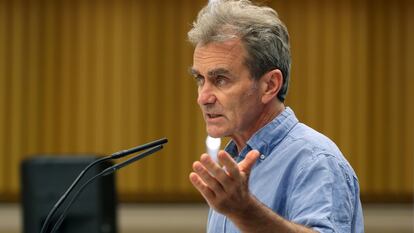Spain reports record rise in coronavirus cases: 10,764 in 24 hours
But health authorities say transmission is “stabilizing,” while the fatality rate has fallen to 0.6%

The coronavirus epidemic in Spain hit a new record on Thursday with 10,764 cases diagnosed in 24 hours, according to the Health Ministry report. This figure does not include cases in the North African exclave city of Ceuta or in the northeastern region of Navarre, which were unable to share their data. Although it is the highest rise in daily cases since the beginning of the health crisis, the curve of transmission is slowing.
Speaking at a government press conference on Thursday, Fernando Simón, the director of the Health Ministry’s Coordination Center for Health Alerts, said the number of new cases was “stabilizing,” with the incidence rate reaching a “plateau.”
According to the latest figures, 7.4% of hospital beds are occupied by coronavirus patients in Spain, compared to 18% in the Madrid region
“Our country has similar figures to the days before. It appears the rises [in daily cases] are stabilizing and in some areas even falling. But we have to be prudent, this stabilization will have to be confirmed in the future, and we have to be careful with the return to school and the workplace, because this could lead to new spikes,” he said, adding that the coronavirus safety measures at schools are “very important.”
When Simón talks of “stabilization,” he is referring to the fact that, despite the record rise in daily cases, the increase in infections in relative terms is lower. The 14-day cumulative incidence of the virus is growing at around 1%.
The Madrid region continues to report nearly one third of all new cases and has the highest cumulative incidence rate of the virus: 535.9 cases per 100,000 people. It is followed by La Rioja and the Basque Country, with 374 and 372 cases respectively. Asturias is the Spanish region with the lowest incidence rate, with 58.7 cases per 100,000 inhabitants, but this is still much higher than the figure in most neighboring European countries, such as the United Kingdom (37.3), Italy (29.2), Germany (19.1) and Portugal (47.4). These countries, however, are also reporting a rise in Covid-19 infections. Indeed France has recently been recording more daily cases than Spain, although its incidence rate is at 126 cases per 100,000 people.
We have to be careful with the return to school and the workplace, because this could lead to new spikesFernando Simón, director of the Health Ministry’s Coordination Center for Health Alerts
Simón said that Covid-19 cases were especially rising in the 10-19 age bracket. According to the health official, this is not due to schools reopening, a situation which will not be reflected in the figures until one to two weeks have passed. “It could be that the last throes of the botellón [the term for outdoor drinking in Spain] and nighttime activities are being reflected [in the rise in new cases] now,” he said. The 20-39 age group continues to have the highest incidence of the virus of Spain’s second wave.
The good news, Simón pointed out, is that the fatality rate continues to fall and is now at 0.6%, second only to Germany, where it is at 0.4%. According to Simón, this is a sign that Spain’s health services are detecting most cases, which are much less severe than in the first wave of the pandemic, and that there is better clinical management of Covid-19 patients. The average age of coronavirus victims has increased to 86, up from 83 in the first wave. “This means that most people who have died were very, very fragile,” explained Simón.
Hospital occupancy continues to slowly rise. According to the latest figures, 7.4% of hospital beds in Spain are occupied by coronavirus patients, while 1,141 people are in intensive care. Simón said that the number of intensive care beds in Spain has risen from 7,000 to 8,000 since the beginning of the pandemic. “We have learned to make beds available very quickly,” he said, adding that more will need to be provided. Although the pressure on most hospitals in Spain is not high, there are some centers, especially those in the Madrid region, where 18% of hospital beds are occupied by Covid-19 patients, that are beginning to feel the strain and have started to postpone non-essential surgeries.
English version by Melissa Kitson.
Tu suscripción se está usando en otro dispositivo
¿Quieres añadir otro usuario a tu suscripción?
Si continúas leyendo en este dispositivo, no se podrá leer en el otro.
FlechaTu suscripción se está usando en otro dispositivo y solo puedes acceder a EL PAÍS desde un dispositivo a la vez.
Si quieres compartir tu cuenta, cambia tu suscripción a la modalidad Premium, así podrás añadir otro usuario. Cada uno accederá con su propia cuenta de email, lo que os permitirá personalizar vuestra experiencia en EL PAÍS.
¿Tienes una suscripción de empresa? Accede aquí para contratar más cuentas.
En el caso de no saber quién está usando tu cuenta, te recomendamos cambiar tu contraseña aquí.
Si decides continuar compartiendo tu cuenta, este mensaje se mostrará en tu dispositivo y en el de la otra persona que está usando tu cuenta de forma indefinida, afectando a tu experiencia de lectura. Puedes consultar aquí los términos y condiciones de la suscripción digital.









































